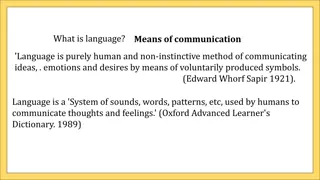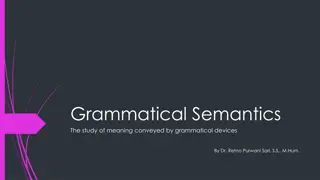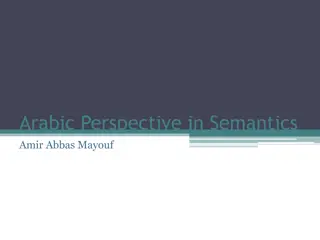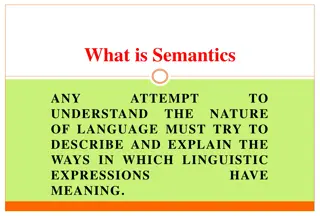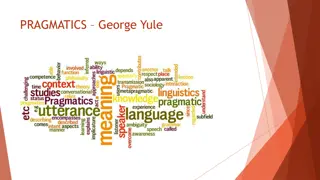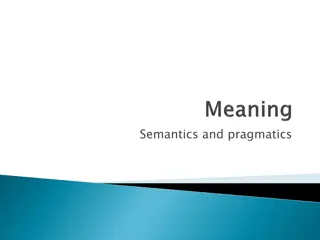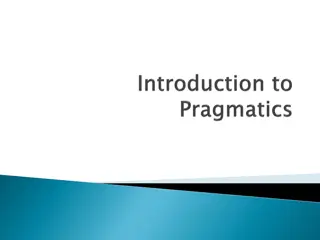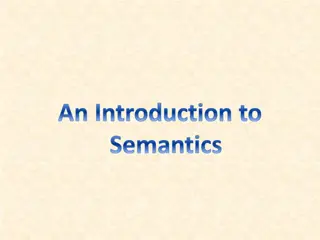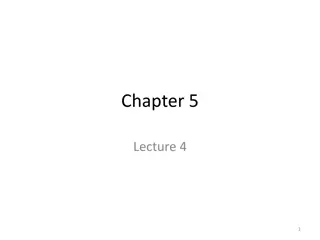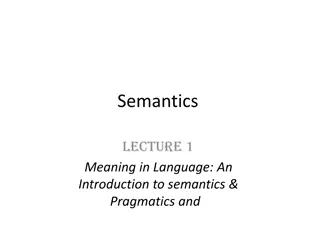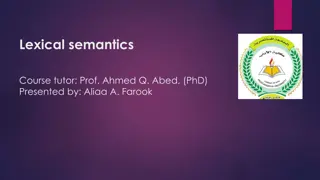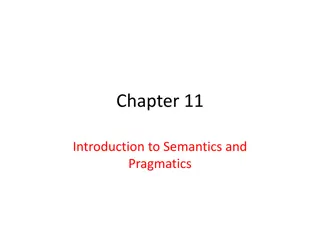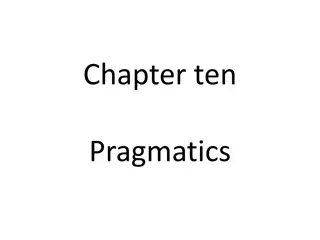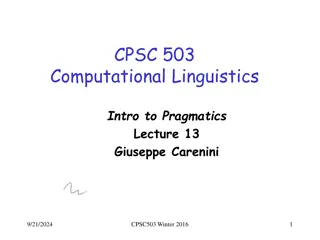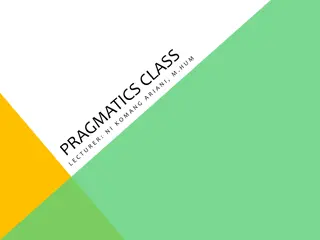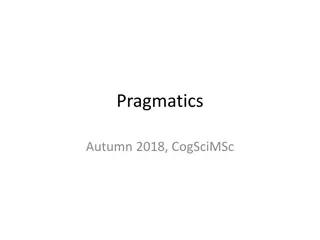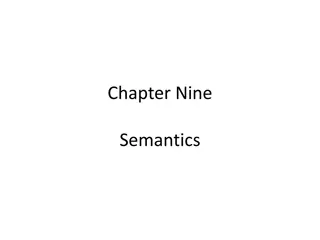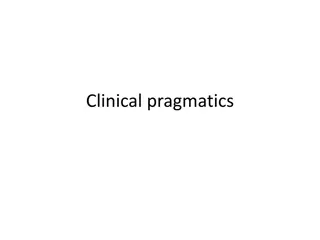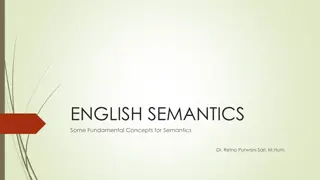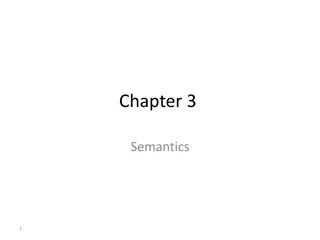Meaning Study: Semantics vs Pragmatics Insights
Dive into the study of meaning with a focus on semantics and pragmatics, exploring denotation, connotation, implicatures, and speech acts. Understand the difference between what is said and what is implicated through practical examples and Grice's maxims.
Download Presentation

Please find below an Image/Link to download the presentation.
The content on the website is provided AS IS for your information and personal use only. It may not be sold, licensed, or shared on other websites without obtaining consent from the author.If you encounter any issues during the download, it is possible that the publisher has removed the file from their server.
You are allowed to download the files provided on this website for personal or commercial use, subject to the condition that they are used lawfully. All files are the property of their respective owners.
The content on the website is provided AS IS for your information and personal use only. It may not be sold, licensed, or shared on other websites without obtaining consent from the author.
E N D
Presentation Transcript
Semantics vs Pragmatics Semantics = the study of meaning, esp. denotation (wikipedia). Pragmatics = the study of meaning, esp. denotation and beyond (connotation)
Reference and Deixis Speech Act Implicatures Politeness Presupposition Conversation Analysis
Proposed by Paul H. Grice (i) the act of meaning, implying, or suggesting one thing by saying something else, or (ii) the object of that act.(Stanford, 2010) What is said vsWhat is implicated What is said can be contradicted, agreed or disagreed with, whereas what is implicated cannot (Cruse, 2011)
A: Has John cleared the table and washed the dishes? B: He has cleared the table. i. That s not true. ii. ? That s not true, he has washed the dishes. iii. You re right. iv. ? You re right, he has washed the dishes What is implicated is he has not washed the dishes B has said that John has cleared the table and implicated that he has not washed the dishes.
Another example Shut that flaming door! ?You have every right to be. ?No, you re not you re only pretending. Anger is not said but implicated. (Cruse, 2011)
Make your contribution such as is required, at the stage at which it occurs, by the accepted purpose or direction, of the talk exchange in which you are engaged. Comprised of 4 maxims
Do not say what you believe to be false. Do not say that for which you lack adequate evidence.
Make your contribution as informative as is required for the current pruposes of the exchange in which you are engaged. Do not make your contribution more informative than is required. Ex. A: What did you have for lunch today? Sandwich ?Food ?I had seven pieces of sandwiches, three of which was slight burnt.
Be relevant A: Have you seen Mary today? B: ?I m breathing. Make the strongest statement that can be relevantly made, justifiable by your evidence (Levinson, 1983) John captured a wild cat >> Somebody caught an animal.
Avoid obscurity. Avoid ambiguity. Avoid unnecessary prolixity (lengthy, wordy). Be orderly. ? The lone ranger rode off into the sunset and jumped on his horse.
Theoretical Definition:S conversationally implicatesp iff Simplicates p when: (i) S is presumed to be observing the Cooperative Principle (cooperative presumption); (ii) The supposition thatSbelievesp is required to makeS's utterance consistent with the Cooperative Principle (determinacy); and (iii) Sbelieves (or knows), and expectsH to believe that Sbelieves, that H is able to determine that (ii) is true (mutual knowledge).
Flouting = Speaker (S) intentionally violates the maxims, knowing that the hearer (H) is well aware of his/her intention. I married a rat. Metaphoric expression It must be somewhere. Further search is needed. A: Did you hear about Mary s B: Yes, well, it rained the whole time (Mary is approaching)
A: Ill look after Sam for you. Dont worry. B: Oh, don t offer her any post-prandial concoctions involving super-cooled oxide of hydrogen.
Conversational Implicatures 1. Generalised conversational Implicatures (GCI) 2.Particularised conversational Implicatures (PCI)
A: What time is it? B: Some of the guests are already leaving PCI: It must be late. GCI: Not all of the guests are already leaving. A: Where s John? B: Some of the guests are already leaving. PCI: Perhaps John has already left. GCI: Not all of the guests are already leaving.
Levinson(200) divides DCI into 3 types Q-Implicatures I-Implicatures M-Implicatures
What you do not say is not the case Choosing a weaker member of a set implicates that the stronger members do not apply He owns 3 cars. Imp: He does not own 4 or 5 cars. It made her ill. Imp: She did not die. The gunman s target was the PM. Imp: The gunman did not hit the PM.
Enrichments of what is said. What is simply expressed is stereotypically exemplified. We went to that new restaurant yesterday. Imp: I had a meal. John is going out with a nurse. Imp: The nurse is female.
Marked expressions call for marked interpretations. There is a good reason to speak unconventionally. Bill caused the car to stop Normal: Bill stopped the car. Imp: Bill did not stop the car in the normal way The corner of Sue s lips turned slightly upwards Normal : Sue Smile. Imp: Sue s expression is not a smile.
cooperative principle is formulated for instances in which interactantsare interested in 'a maximally effective exchange of information' (Grice, 1975: 47). We cannot assume that a writer's primary purpose in writing a literary text is the effective exchange of information nor, even, that the writer necessarily intends the reader to grasp his or her intentions (Hickey, 1998).
the writer at least would like the reader to grasp the basic, literal meaning of his or her written utterance and that the reader shares this desire; as long as this is all that is meant by the effective exchange of information.
Render exactly what S says and implicates Facilitate the communication between S and H Textual equivalence vsMaximal cooperation
World Economic Forumon East Asia 2555 Ms.YingluckShinawatra, the Prime Minister of Thailand, gave the opening speech at . (The context is not clear whether it is known that Ms.Yingluck is from Thailand.) observe Maxim of Quantity
7 ( ) ( . ) Communication and learning exchange process between different groups from the seven villages i.e. local administrative officers ( the sub-district headman, the village headmen, the village committee members, the municipality members), community leaders (housewives, volunteers, elders, agricultural officers, youths), monks, teachers and other inhabitants
Cruse, D.A. (2011). Meaning in Language. Fawcett, Peter (2003). Translation and Language. Hickey, L. (1998). The Pragmatics of Translation Topics. Levinson, S.C. (1983). Pragmatics. Stanford Encyclopedia of Philosophy (2010). Implicatures.


